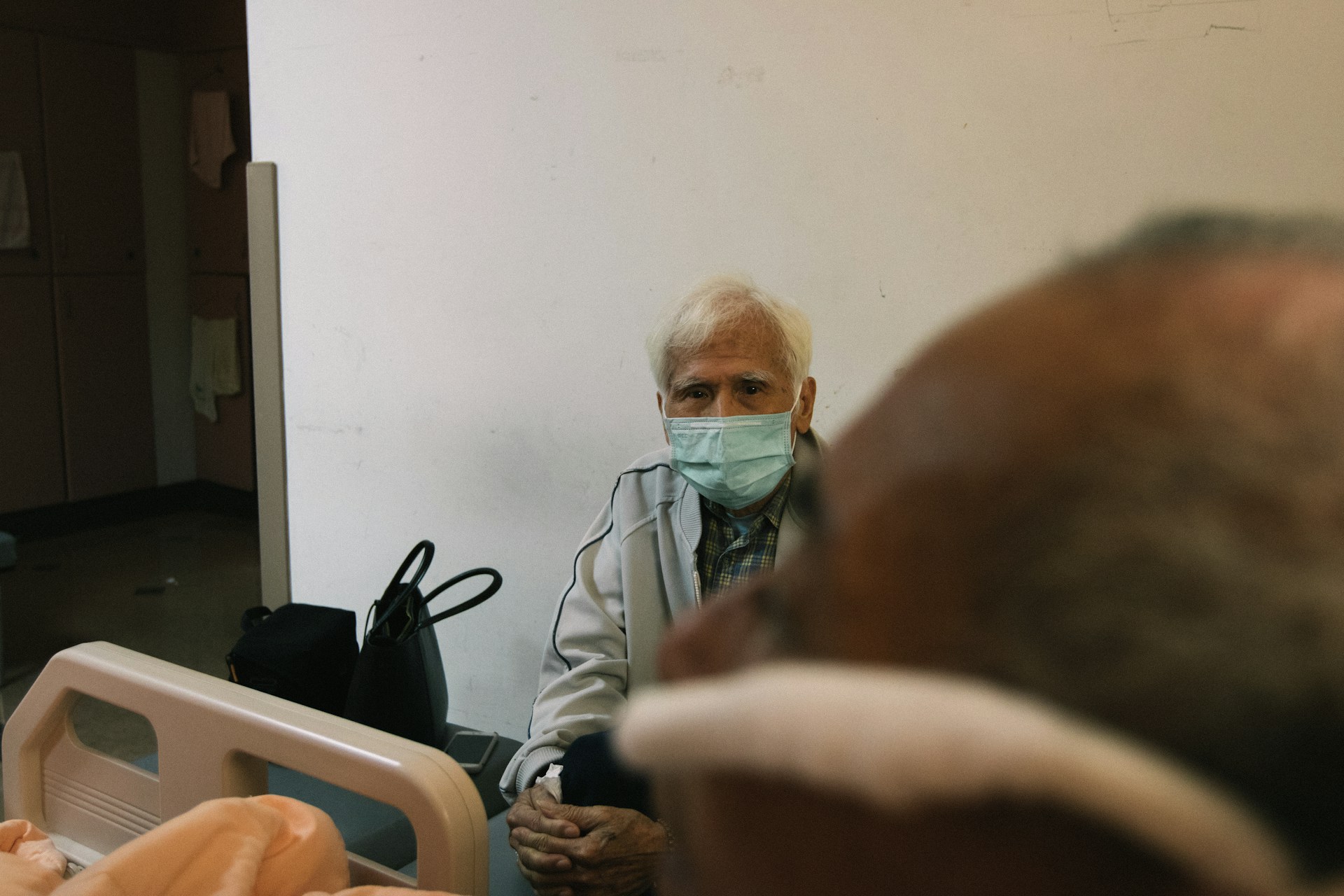Analysis of Risk Factors Contributing to Hypertension in Pre-Elderly and Elderly Populations in the Kedaung Subdistrict, Depok, Indonesia
Analisis Faktor Risiko Kejadian Hipertensi pada Pra Lansia dan Lansia di Kelurahan Kedaung Kota Depok

Downloads
Background: West Java Province ranks third in Indonesia's highest incidence of hypertension. According to Depok City Health Office data, 3,283 individuals aged ≥15 years in the Kedaung Subdistrict suffer from hypertension, highlighting multifactorial causes beyond aging.
Objectives: To identify the primary risk factors for hypertension in pre-elderly and elderly individuals in the Kedaung Subdistrict.
Methods: The study utilized a cross-sectional design involving pre-elderly and elderly individuals from the Kedaung Subdistrict. The research sample comprised 50 participants selected using stratified random sampling techniques. Data collection was conducted through a structured questionnaire. Univariate analysis was performed using frequency distribution, bivariate analysis using chi-square tests, and multivariate analysis using a logistic regression test.
Results: Nutritional status (p-value=0.028) and sodium intake (p-value=0.016) were significantly associated with hypertension among pre-elderly and elderly individuals in the Kedaung Subdistrict. Conversely, family history (p-value=0.615) and smoking habits (p-value=0.459) showed no significant association with hypertension.
Conclusions: Sodium (sodium) intake was identified as a significant risk factor for hypertension among pre-elderly and elderly individuals in the Kedaung Subdistrict. Individuals with excessive sodium intake have a higher likelihood of developing hypertension compared to those with lower sodium consumption. Pre-elderly and elderly populations are advised to monitor and regulate their sodium intake to reduce the risk of hypertension.
Siregar, R. anastasya. Penyuluhan tentang Hipertensi pada Lansia di Desa Lubuk Raya Kecamatan Padangsidimpuan Hutaimbaru Tahun 2024. J. Pengabdi. Masy. Aufa 6, 35–39 (2024). https://doi.org/10.51933/jpma.v6i1.1292.
Balitbangkes. Laporan Riskesdas 2018 Nasional.pdf. Lembaga Penerbit Balitbangkes hal 156 at https://repository.badankebijakan.kemkes.go.id/id/eprint/3514/1/Laporan Riskesdas 2018 Nasional.pdf (2018).
Kementerian Kesehatan Republik Indonesia. Indonesian Health Survey (Survei Kesehatan Indonesia) 2023. Survei Kesehat. Indones. 1–68 (2023).
Dinas Kesehatan Kota Depok. Profil Kesehatan Kota Depok 2023. 100 (2023).
Heriziana, H. Faktor Resiko Kejadian Penyakit Hipertensi Di Puskesmas Basuki Rahmat Palembang. J. Kesmas Jambi 1, 31–39 (2017). https://doi.org/10.22437/jkmj.v1i1.3689.
Muhammad Yunus, I Wayan Chandra Aditya, D. R. E. Hubungan Usia dan Jenis Kelamin dengan Kejadian Hipertensi di Puskesmas Haji Pemanggilan Kecamatan Anak Tuha Kab. Lampung Tengah. 35, 229–239 (2021). https://doi.org/10.33024/jikk.v8i3.5193.
Kementerian Kesehatan Republik Indonesia. Peraturan Menteri Kesehatan Republik Indonesia Nomor 30 Tahun 2013 Tentang Pencantuman Informasi Kandungan Gula, Garam, Dan Lemak Serta Pesan Kesehatan Untuk Pangan Olahan Dan Pangan Siap Saji. Kementeri. Kesehat. Republik Indones. 1–8 (2013).
Rahayu, R. M. et al. Hubungan Obesitas Dengan Hipertensi Pada Pra Lansia di Puskesmas Sukamulya Tahun 2019. J. Untuk Masy. Sehat 4, 102–111 (2020). https://doi.org/10.52643/jukmas.v4i1.806.
Fariqi, M. Z. Al. Hubungan Antara Status Gizi Dengan Kejadian Hipertensi Pada Lansia Di Puskesmas Narmada Lombok Barat The Relationship Between Nutritional Status And The Incidence Of Hypertension In The Elderly At Narmada Health Center , West Lombok. 02, 15–22 (2021). https://doi.org/10.30812/nutriology.v2i2.1584.
Ahsana, N. M. & Herdiani, N. Hubungan Status Gizi dengan Tingkatan Hipertensi pada Lansia di Puskesmas Klampis Ngasem Surabaya. J. Kesehat. Masy. Mulawarman 4, 52 (2022). https://doi.org/10.30872/jkmm.v4i1.7991.
Taslima, T. & Husna, A. Hubungan Riwayat Keluarga dan Gaya Hidup dengan Hipertensi pada Lansia di Puskesmas Kuta Alam Banda Aceh. J. Healthc. Technol. Med. 3, 121 (2017). https://doi.org/10.33143/jhtm.v3i1.264.
Maulidina, F. Faktor-Faktor yang Berhubungan dengan Kejadian Hipertensi di Wilayah Kerja Puskesmas Jati Luhur Bekasi Tahun 2018. ARKESMAS (Arsip Kesehat. Masyarakat) 4, 149–155 (2019). https://doi.org/10.22236/arkesmas.v4i1.3141.
Ariyani, A. R. Kejadian Hipertensi pada Usia 45-65 Tahun. Higeia J. Public Heal. Res. Dev. 4, 506–518 (2020). https://doi.org/10.15294/higeia.v4iSpecial%203.40392.
Aja, N. Faktor-faktor yang berhubungan dengan tingkat hipertensi pada Lansia di wilayah kerja Puskesmas Dama Tahun 2018. Epidemiologi 5, 137–149 (2018).
Erman, I., Damanik, H. D. & Sya’diyah, S. Hubungan Merokok dengan Kejadian Hipertensi di Puskesmas Kampus Palembang. JKM J. Keperawatan Merdeka 1, 54–61 (2021). https://doi.org/10.22236/arkesmas.v4i1.3141.
Imelda, I., Sjaaf, F. & Puspita, T. Faktor-Faktor Yang Berhubungan Dengan Kejadian Hipertensi Pada Lansia Di Puskesmas Air Dingin Lubuk Minturun. Heal. Med. J. 2, 68–77 (2020). https://doi.org/10.33854/heme.v2i2.532.
Lauren, G., Febriyanty, D., Wahidin, M. & Heryana, A. Faktor – Faktor Yang Berhubungan Dengan Kejadian Hipertensi Pada Pasien 45-59 Tahun Di Puskesmas Bintaro Jakarta Selatan Pada Tahun 2022. J. Kesehat. Masy. 11, 308–317 (2023). https://doi.org/10.14710/jkm.v11i3.35795.
Umbas, I. M., Tuda, J. & Numansyah, M. Hubungan Antara Merokok Dengan Hipertensi Di Puskesmas Kawangkoan. J. Keperawatan 7, (2019). https://doi.org/10.35790/jkp.v7i1.24334.
Abdurrachim, R., Hariyawati, I. & Suryani, N. Hubungan Asupan Natrium, Frekuensi Dan Durasi Aktivitas Fisik Terhadap Tekanan Darah Lansia Di Panti Sosial Tresna Werdha Budi Sejahtera Dan Bina Laras Budi Luhur Kota Banjarbaru, Kalimantan Selatan. Gizi Indones. 39, 37 (2017). https://doi.org/10.36457/gizindo.v39i1.209.
Firman, F. Hubungan Konsumsi Natrium/Garam dengan Status Hipertensi: Studi Cross Sectional di Kota Makassar. Multidiscip. J. Educ. , Econ. Cult. 2, 43–49 (2024). https://doi.org/10.61231/mjeec.v2i1.234.
Purwono, J., Sari, R., Ratnasari, A. & Budianto, A. Pola Konsumsi Garam Dengan Kejadian Hipertensi Pada Lansia. J. Wacana Kesehat. 5, 531 (2020). https://doi.org/10.52822/jwk.v5i1.120.
Diba, F., Haningsih, S., Pangestuti, D. & Nasution, H. T. Analisis Makanan Tinggi Natrium terhadap Kejadian Hipertensi pada Pra Lansia dan Lansia di Puskesmas Medan Area Selatan. Njm 9, 1–5 (2023). https://doi.org/10.36655/njm.v9i1.1156.
Ramadhini, D., Arbaiyah, I., Ritonga, S. H. & Ritonga, N. Pengaruh Asupan Natrium dengan Kejadian Hipertensi pada Lansia di Desa Hutaimbaru Kota Padangsidimpuan. J. Kesehat. Ilm. Indones. (Indonesian Heal. Sci. Journal) 8, 163–169 (2023). https://doi.org/10.51933/health.v8i1.1040.
ASiah, N. A., Majid, R. & Akifah, A. Hubungan Konsumsi Makanan Asin, Merokok, Aktivitas Olahraga Dan Stres Dengan Kejadian Hipertensipada Lansia Di Wilayah Kerja Puskesmaslepo-Lepo Kota Kendari Tahun 2020. J. Wawasan Promosi Kesehat. 2, 82–89 (2022). https://doi.org/10.37887/jwins.v2i3.29382.
Copyright (c) 2025 Amerta Nutrition

This work is licensed under a Creative Commons Attribution-ShareAlike 4.0 International License.
AMERTA NUTR by Unair is licensed under a Creative Commons Attribution-ShareAlike 4.0 International License.
1. The journal allows the author to hold the copyright of the article without restrictions.
2. The journal allows the author(s) to retain publishing rights without restrictions
3. The legal formal aspect of journal publication accessibility refers to Creative Commons Attribution Share-Alike (CC BY-SA).
4. The Creative Commons Attribution Share-Alike (CC BY-SA) license allows re-distribution and re-use of a licensed work on the conditions that the creator is appropriately credited and that any derivative work is made available under "the same, similar or a compatible license”. Other than the conditions mentioned above, the editorial board is not responsible for copyright violation.












































